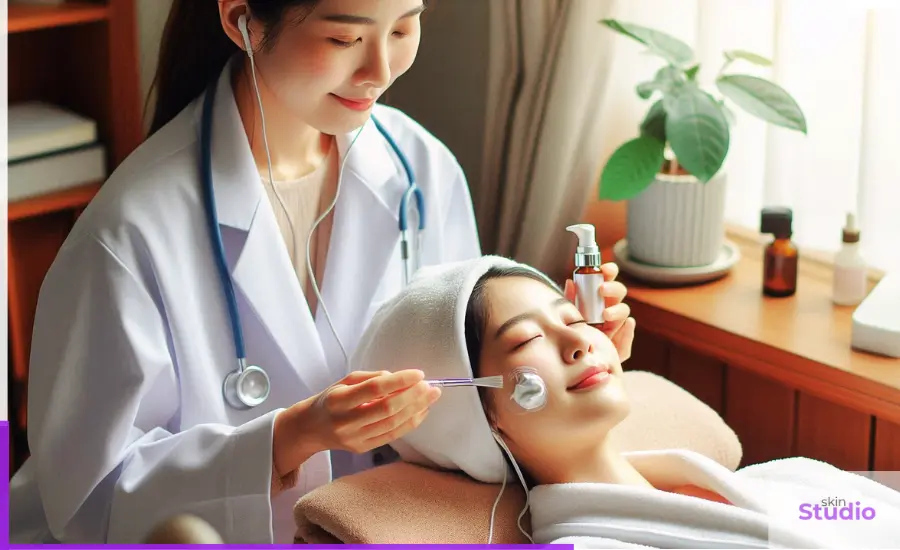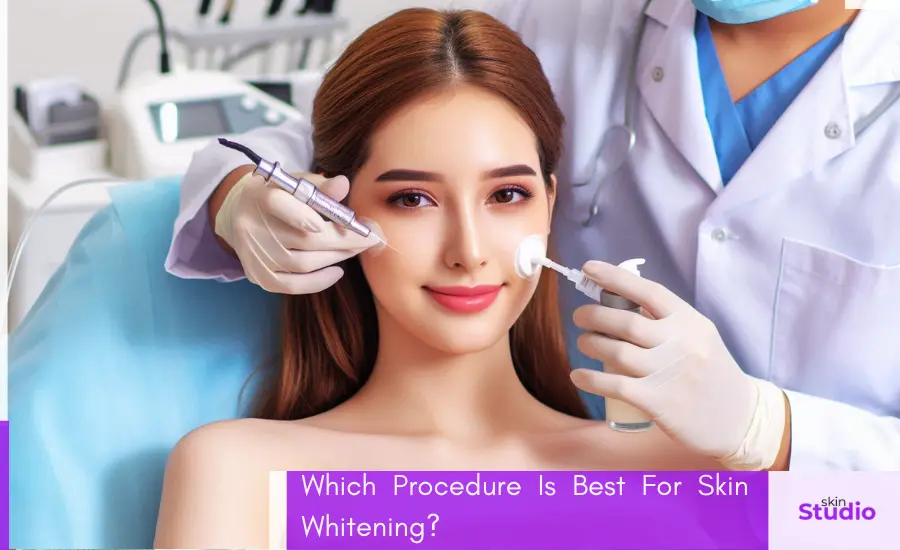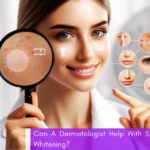Dermatologists recommend the most effective skin whitening treatments.
Achieving a beautiful, spotless, and radiant complexion is a common goal for many. While creams, home remedies, and facials can help, dermatological skin-whitening procedures have become increasingly popular. These treatments, also known as skin bleaching or skin whitening, aim to reduce melanin, the pigment responsible for skin color. Excess melanin can cause hyperpigmentation, uneven skin tone, dark spots, and patches. Dermatologist-recommended skin whitening treatments effectively target these issues, leading to a lighter and more even complexion.
Skin whitening treatments recommended by top dermatologists

Topical Creams and Lotions
Dermatologists often recommend topical creams and lotions containing ingredients like hydroquinone, glycolic acid, kojic acid, arbutin, licorice extract, azelaic acid, retinoids, and botanical extracts. Applied directly to the skin, these products inhibit melanin production through various pathways. A certified dermatologist can prescribe the right cream based on your skin type and tone, ensuring safety and effectiveness.
Chemical Peels
Chemical peels involve applying a chemical solution to the skin, which exfoliates the outer layer, eliminating dark spots and promoting new, lighter skin. This treatment is effective for hyperpigmentation, acne scars, and other skin discolorations. The process involves the application of a chemical agent to remove the damaged outer layer, followed by the regeneration of new epidermal and dermal tissues, resulting in improved skin texture and tone. It’s crucial to have chemical peels done by trained professionals to minimise the risk of complications.
Laser Therapy
Laser treatments for skin whitening use specific wavelengths of light to target and break down melanin, reducing pigmentation irregularities. These treatments commonly use Q-Switch lasers. Laser therapy requires multiple sessions to achieve the desired results and is safe when performed by professionals. Fractional lasers also contribute to skin rejuvenation, improving overall skin appearance.
Microdermabrasion
Microdermabrasion is a non-invasive procedure that gently exfoliates the outer layer of the skin using a handheld device. This process removes dead skin cells, revealing fresher and brighter skin. It is particularly effective for treating uneven skin tone, melasma, scars, and acne scars.
Oral treatments and injections
Oral skin whitening agents like glutathione, tranexamic acid, and pine bark extracts, along with intravenous injections of antioxidants, are popular skin whitening treatments. These methods are suitable for all skin types and help achieve brighter, healthier skin. In addition to whitening effects, they combat skin ageing concerns such as hyperpigmentation, dull skin, wrinkles, and age spots. PRP (Platelet-Rich Plasma) and GFC (Growth Factor Concentrate) treatments also aid in skin rejuvenation and anti-ageing.
Medi-Facials
Medi-facials are medical-grade facials performed at dermatology clinics. Dermatologists design these treatments to address specific skin conditions or disorders, and they are safe for almost all skin types. Customised medi-facials are recommended based on individual skin concerns and utilise advanced devices and techniques like Dermaclear and HydraFacial. Medi-facials effectively treat pigmentation issues, sun damage, and signs of ageing.
Before opting for a skin whitening treatment, consider these factors.

Before undergoing any skin whitening treatment, it’s important to understand the potential risks and limitations:
Side Effects
Some skin-whitening treatments may cause side effects such as skin irritation, redness, dryness, and increased sensitivity to sunlight. Following pre- and post-care instructions provided by professionals is crucial to minimising these risks.
Safety Concerns
Certain ingredients commonly found in skin whitening products, such as hydroquinone and steroids, have raised safety concerns due to potential long-term risks. Consulting with a board-certified dermatologist ensures the products and treatments used are safe and suitable for your skin concerns.
Sustainable Approach
Achieving and maintaining healthy, radiant skin involves more than just skin lightening treatments. A holistic approach that includes a balanced diet, adequate hydration, sufficient sleep, and a consistent skincare routine is essential for overall skin health.
Conclusion
While skin whitening treatments offer significant benefits for individuals seeking to address specific skin concerns, such as hyperpigmentation, it’s crucial to approach these treatments with caution and prioritise safety. Consulting the best dermatologist is vital to determining the most suitable and safe approach to achieving healthy, radiant skin.


